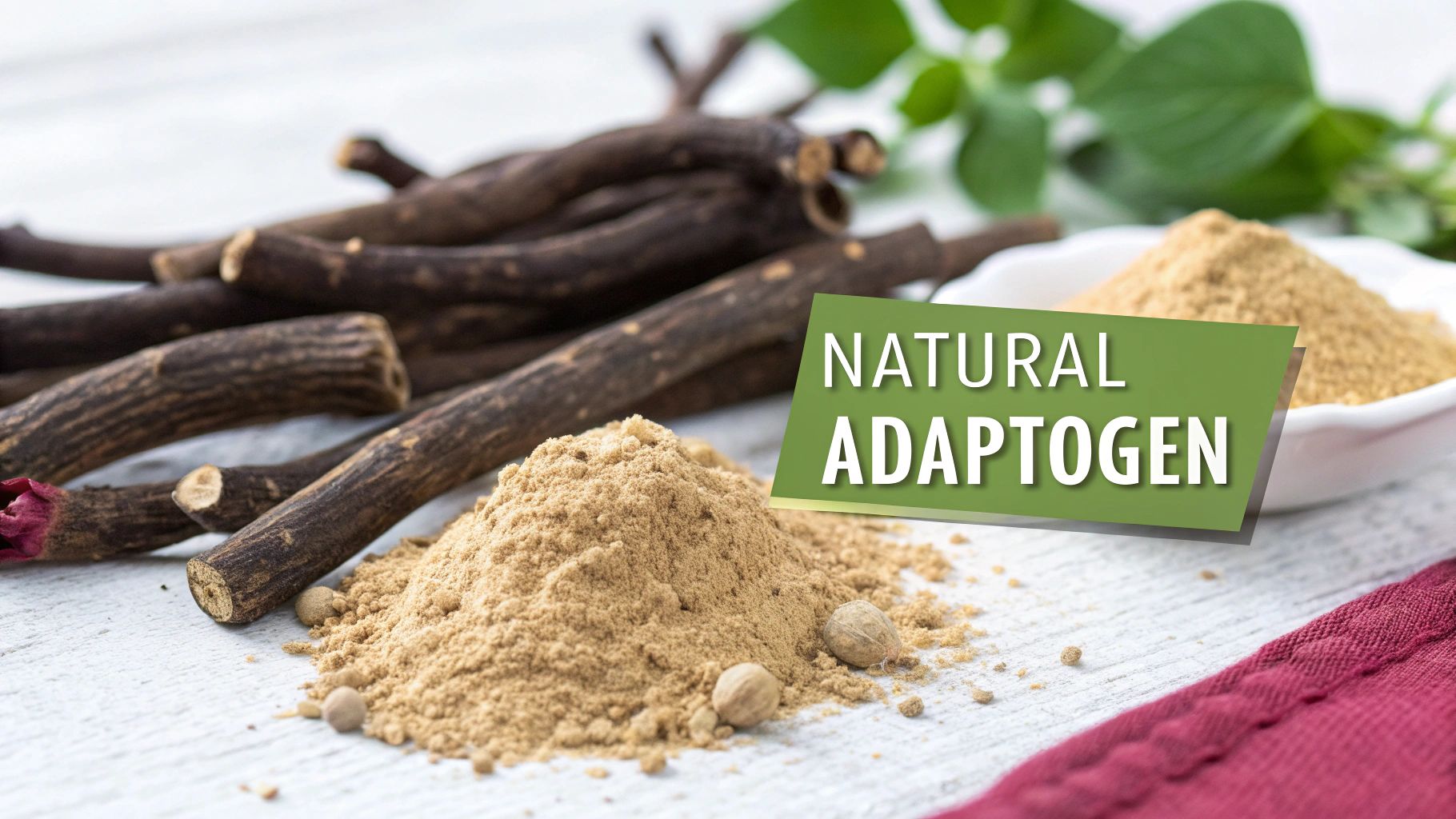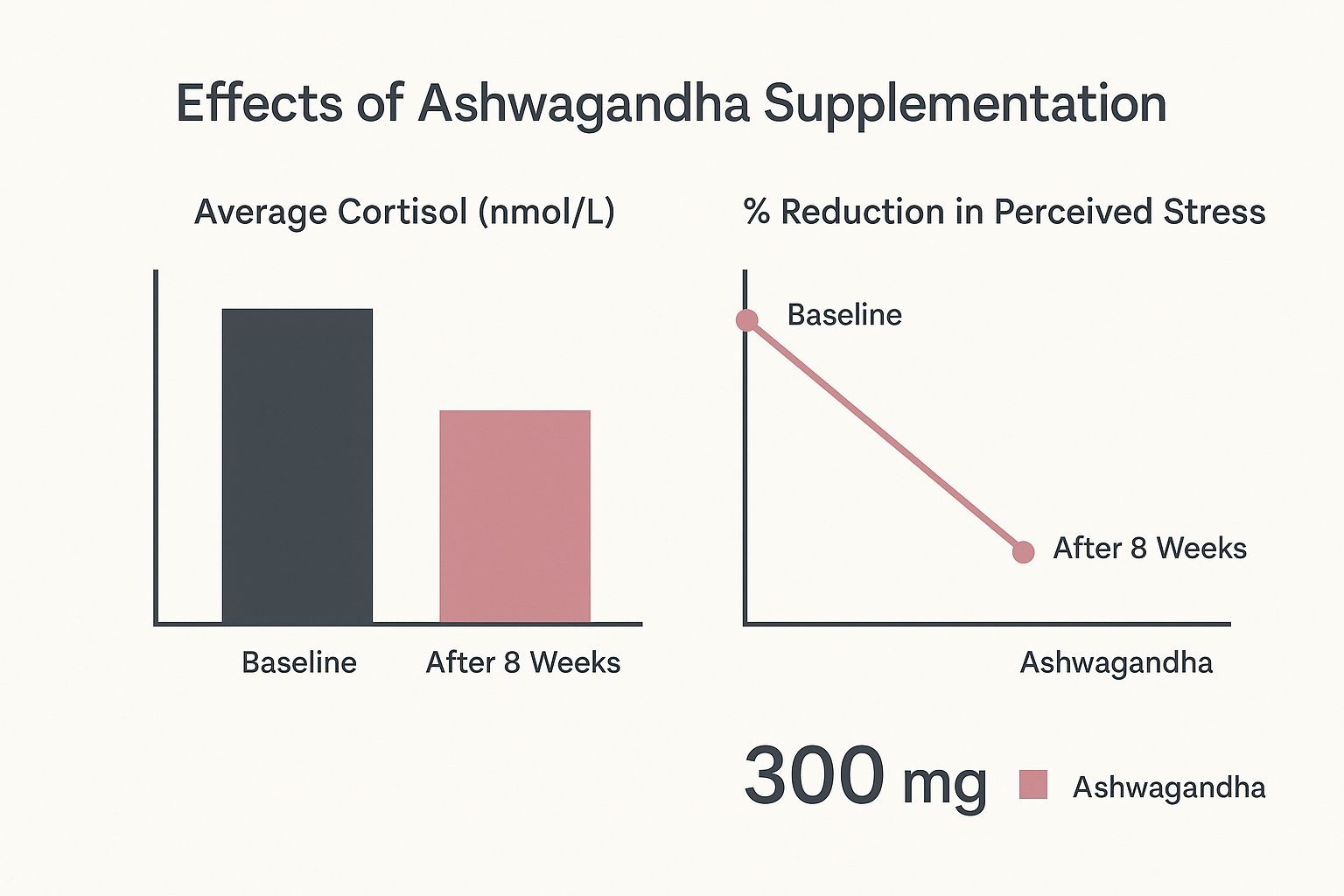Why Everyone's Talking About Ashwagandha For Stress

You've probably heard the buzz about ashwagandha and its potential to help manage stress. This ancient herb is appearing everywhere, from health blogs to casual conversations. But what's behind the growing interest? Ashwagandha offers a different perspective on stress management, moving beyond quick fixes.
Understanding Ashwagandha as an Adaptogen
Instead of simply masking symptoms, ashwagandha helps your body adapt to stress more effectively. This is because it's classified as an adaptogen. Adaptogens are a unique group of herbs known to improve the body's resilience to both physical and emotional stress.
Imagine training your body to handle stress like an athlete trains for competition – building strength and endurance over time. Rather than temporarily covering up the feeling of stress, ashwagandha helps your body manage stress more effectively long-term. This leads to more sustainable stress relief and a greater sense of overall well-being.
The Regulatory Landscape and Growing Popularity
The increased interest in ashwagandha in the UK is happening alongside evolving regulations. While the herb has gained significant attention for its potential stress-relieving benefits, the Food Standards Agency (FSA) hasn't yet set official safe consumption levels or regulatory limits for its use as a food supplement.
Despite this, ashwagandha's popularity continues to grow, fueled by its long history of use in traditional Indian medicine and a rise in consumer interest in natural remedies for stress, anxiety, and sleep problems. This speaks volumes about the increasing desire for natural stress and anxiety management options. Many are seeking solutions beyond conventional medications, finding the holistic approach of ashwagandha appealing.
Why Choose Ashwagandha?
So, why are so many people turning to ashwagandha for stress relief? Its natural origin, adaptogenic qualities, and the possibility of long-term benefits contribute to its appeal. This makes it especially attractive for those looking for sustainable, non-pharmaceutical approaches to managing the pressures of modern life. Ashwagandha represents a promising path toward reclaiming control over personal well-being.
What Science Actually Says About Ashwagandha For Stress
Ashwagandha has been getting a lot of attention lately for its potential stress-relieving properties. But what does the research really say? Let's explore the science behind ashwagandha and its impact on stress.
Clinical Trials and Stress Reduction
Many clinical trials have examined how ashwagandha affects stress. These studies, often using a randomized, double-blind, placebo-controlled format, provide valuable insights. This rigorous approach helps minimize bias and ensure accurate results. For instance, one study showed participants taking ashwagandha had a significant drop in cortisol, a major stress hormone. This suggests ashwagandha can influence the body's physical stress response.
Participants also reported feeling less stressed and anxious, showcasing potential mental health benefits. These findings highlight ashwagandha's potential to address both the physical and mental aspects of stress.
The infographic below visualizes data from an eight-week study. It compares cortisol levels and perceived stress scores between participants taking ashwagandha and those taking a placebo. It also highlights the recommended 300 mg daily dose.

As the infographic illustrates, the ashwagandha group saw a significant reduction in both cortisol levels and perceived stress scores after eight weeks, suggesting its potential effectiveness in stress management.
To further illustrate the findings of various studies, let's examine a comparison table:
Clinical Study Results: Ashwagandha vs Placebo Comparison of stress reduction outcomes from major clinical trials
| Study Duration | Dosage | Stress Reduction | Cortisol Change | Anxiety Improvement |
|---|---|---|---|---|
| 60 days | 240 mg | 34.2% reduction in stress markers | Significant decrease | Significant reduction in anxiety scores |
| 8 weeks | 300 mg | Significant reduction in perceived stress scores | Significant decrease | Improvements reported |
| Note: Results may vary depending on individual factors and study specifics. |
This table summarizes key findings from different clinical trials, showcasing the potential benefits of ashwagandha for stress reduction, cortisol management, and anxiety improvement.
Further Research Findings
Studies on stress in adults show measurable improvements with ashwagandha. One 60-day randomized, double-blind, placebo-controlled trial with 60 stressed adults found a 34.2% reduction in stress markers for the ashwagandha group, compared to 18% for the placebo group. Participants taking 240 mg of standardized ashwagandha extract daily showed better scores on psychological scales, including lower anxiety and cortisol levels. Learn more about ashwagandha and stress reduction here. This further strengthens the case for ashwagandha as a valuable tool for stress management.
How Ashwagandha Influences Stress Response
Ashwagandha is believed to work by affecting the hypothalamic-pituitary-adrenal (HPA) axis, the system that controls the body's stress response. By influencing this system, ashwagandha might lessen the impact of stress hormones like cortisol. This could lead to increased calmness and resilience when facing stressful situations. More research is underway to fully understand the complex ways ashwagandha interacts with our stress response. However, current evidence indicates it can be a helpful aid in managing stress effectively.
The Hidden Cost Of Chronic Stress In Modern Life

We often think of stress as a temporary hurdle, something we can simply push through. However, chronic stress quietly impacts our bodies and minds, affecting everything from our physical health to our relationships and overall well-being. Understanding the true cost of this constant stress is vital for our health.
The Impact of Chronic Stress on Physical Health
Chronic stress doesn't just make us feel tense. It manifests in physical symptoms. Persistent stress can disrupt sleep, weaken our immune system, and contribute to digestive issues.
It's also linked to serious health problems like cardiovascular disease and high blood pressure. Managing stress isn't just about feeling better; it's about protecting our long-term health.
Mental Wellbeing and Daily Functioning
The impact of chronic stress on mental well-being is significant. It can worsen existing anxiety and depression, making daily challenges harder to face. This can lead to difficulty concentrating, reduced productivity at work, and strained relationships.
Chronic stress creates a vicious cycle. The inability to cope leads to more stress, further impacting mental and emotional health. For practical tips on reducing stress at work, read: How to reduce stress at work.
Why Traditional Stress Management Falls Short
Many traditional stress management techniques, while helpful in the short term, often miss the root causes of stress. A hot bath or calming music can offer temporary relief. However, these methods don't necessarily equip us to handle the ongoing pressures of modern life.
This is where natural solutions like ashwagandha for stress become relevant, offering a potentially more comprehensive approach. Stress is a significant health issue in the UK. Chronic stress affects approximately one in six adults, according to national health surveys. This contributes to a high prevalence of anxiety and depression, conditions that ashwagandha supplements aim to address.
The increasing use of ashwagandha in the UK highlights a growing trend toward natural stress management solutions. This comes as stress-related conditions cause roughly 70 million lost workdays annually. Finding effective long-term strategies is crucial for managing the widespread impact of stress. Ashwagandha, with its potential to support the body's natural stress response, provides a promising option for those seeking more holistic and sustainable solutions. Explore this topic further.
Choosing The Right Ashwagandha For Your Stress Relief
Navigating the world of ashwagandha supplements can feel overwhelming with so many options available. Capsules, powders, tinctures…how do you know which one is right for you? Not all ashwagandha products are created equal. Finding the right one for stress relief means understanding what truly matters: decoding labels, understanding extraction methods, and recognizing the standardization processes that influence potency and effectiveness.
Decoding Supplement Labels: What To Look For
When choosing an ashwagandha supplement, start by carefully examining the label. Look for standardized extracts that specify the percentage of withanolides. Withanolides are the active compounds believed to be responsible for ashwagandha's stress-relieving benefits. A common standardization is 5% withanolides, although higher concentrations are available.
Additionally, check for certifications like GMP (Good Manufacturing Practices) and organic certification to ensure quality and purity. These certifications indicate the supplement has been manufactured according to specific standards.
Exploring Extraction Methods and Standardization
Different extraction methods can affect the concentration of withanolides. KSM-66 and Sensoril are two well-known standardized ashwagandha extracts backed by clinical research. Understanding these different extraction and standardization processes is key to finding a high-quality supplement. This helps ensure you are getting a product that delivers research-backed effectiveness.
Choosing The Right Format and Dosage
Ashwagandha supplements come in various formats, each with its own set of advantages and disadvantages. Let's explore some of the most common options:
- Capsules and Tablets: Convenient and offer precise dosing, making them a popular choice.
- Powders: Offer flexibility, allowing you to mix them into smoothies or drinks. However, they require careful measurement.
- Tinctures: Known for quick absorption, tinctures can have a strong taste that some may find unpleasant.
The best format for you depends on your personal preferences and lifestyle. Dosage is another important consideration. Most studies demonstrating benefits for stress use dosages between 300-600mg of standardized extract per day. It's always best to start with a lower dose and gradually increase as needed, under the guidance of a healthcare professional. This allows you to monitor your body's response.
To help you compare the various formats, take a look at the table below:
Ashwagandha Supplement Comparison Guide Overview of different ashwagandha formats, dosages, and considerations
| Format | Typical Dosage | Absorption Rate | Convenience | Cost Effectiveness |
|---|---|---|---|---|
| Capsules/Tablets | 300-600mg | Moderate | High | Moderate |
| Powder | 300-600mg | Moderate | Moderate | High |
| Tincture | Varies | High | Moderate | Moderate |
This table provides a general overview and it’s important to consult the specific product label for dosage instructions. The cost-effectiveness can also vary depending on the brand and concentration.
Timing, Bioavailability, and Safe Starting Practices
For maximum benefit, consider taking ashwagandha with food. This can enhance absorption and minimize the possibility of mild stomach upset. Some people find taking it in the morning provides an energy boost, while others find it beneficial in the evening for better sleep. Experiment to find what works best for your individual needs.
Check out our guide on boosting energy and wellness naturally. You might find helpful tips for stress management.
Remember, ashwagandha is not a quick fix; it takes time to experience its full stress-relieving potential. Be patient and consistent with your routine. It may take several weeks, or even months, to notice significant changes. Ashwagandha works best as part of a holistic approach to stress management. Combine it with healthy lifestyle practices like regular exercise, a balanced diet, and sufficient sleep for optimal results. By integrating ashwagandha into a broader wellness plan, you can maximize its potential to help reduce stress and improve your overall well-being.
Safety First: What You Need To Know Before Starting
Ashwagandha is generally considered safe. However, understanding potential risks and contraindications is crucial for responsible use, especially when using it for stress management. This allows you to make informed decisions about adding this ancient herb to your wellness routine.
Potential Side Effects and Drug Interactions
Like any supplement, ashwagandha can have side effects. These are typically mild and infrequent. Some reported side effects from clinical trials include mild gastrointestinal issues, such as diarrhea or nausea. These often resolve on their own.
Ashwagandha can interact with certain medications. It may increase the effects of sedatives or thyroid medications. Consult your GP before starting ashwagandha if you are taking any prescription medications, especially for diabetes, blood pressure, or thyroid conditions. This helps avoid potential interactions.
Who Should Avoid Ashwagandha?
Some individuals should avoid ashwagandha entirely. This includes pregnant or breastfeeding women, as its effects during these times are not fully understood. People with autoimmune conditions like lupus or rheumatoid arthritis should exercise caution, as ashwagandha may stimulate the immune system and potentially worsen symptoms. Individuals with thyroid disorders should also speak with their doctor before use, as it can impact thyroid hormone levels.
Quality Control and Reputable Products
The supplement industry is not strictly regulated, meaning product quality can vary. When choosing an ashwagandha supplement, look for reputable brands that follow Good Manufacturing Practices (GMP) and conduct third-party testing to verify purity and potency. This ensures the safety and effectiveness of the ashwagandha you choose. You might be interested in: Gummies: The Tasty & Easy Way To Take Your Supplements.
Monitoring Your Body’s Response and Seeking Professional Guidance
When starting any new supplement, pay attention to how your body responds. Begin with a low dose of ashwagandha and gradually increase as needed, observing any changes. While mild side effects can occur, discontinue use and consult your doctor if you experience significant or persistent discomfort.
Ashwagandha is a powerful herb with potential benefits. By understanding the safety guidelines, taking precautions, and working with your GP, you can explore its potential for stress relief and improved well-being. Open communication with healthcare professionals is key for safe and effective supplement use.
Getting Maximum Results From Your Ashwagandha Routine

Simply taking ashwagandha isn't a guaranteed solution for stress relief. To truly benefit, a more thoughtful approach is essential. Think of ashwagandha as working in partnership with your body – it thrives when combined with healthy lifestyle choices that complement its natural effects.
Lifestyle Factors That Enhance Ashwagandha's Effectiveness
Several lifestyle choices can significantly impact how well ashwagandha works for you. Focusing on these areas can create a synergy, maximizing the herb’s stress-reducing properties.
-
Sleep Optimization: Quality sleep is paramount for stress management. Ashwagandha can help improve sleep, but pairing it with good sleep hygiene can supercharge its effectiveness. This means maintaining a consistent sleep schedule, developing a relaxing bedtime routine, and ensuring a dark, quiet bedroom.
-
Exercise: Regular physical activity is a known stress reliever. Exercise and ashwagandha work well together by further lowering cortisol levels and increasing endorphins. Discover activities you enjoy, like brisk walking, yoga, or cycling, and aim for at least 30 minutes most days.
-
Diet: A balanced diet plays a vital role in well-being and stress management. Nutrient deficiencies can worsen stress, so focus on consuming whole foods, including fruits, vegetables, whole grains, and lean protein. Nutrients like magnesium and vitamin B6 are known to support adrenal function and a healthy stress response.
Combining Ashwagandha With Other Natural Stress Management Techniques
Ashwagandha is highly compatible with other natural stress-reducing methods. Mindfulness practices like meditation or deep breathing exercises can further amplify ashwagandha's calming effects.
Time spent in nature, pursuing hobbies, and nurturing social connections are also valuable stress management tools. Combining these approaches with ashwagandha allows for a comprehensive and personalized stress-relief plan.
Realistic Timelines and Tracking Your Progress
Don’t expect immediate changes. While some individuals notice improvements within a few weeks, it may take several months to fully experience ashwagandha's benefits. Patience and consistency are key.
Consider tracking your progress with a journal or a stress-tracking app. Monitor your stress levels, sleep quality, and any other relevant symptoms. This record can reveal how ashwagandha affects you over time and inform any necessary adjustments.
Common Mistakes and Optimal Timing
Inconsistent dosing or prematurely stopping ashwagandha are common missteps. Consistency is crucial for achieving optimal results. Another mistake is neglecting other lifestyle factors. Remember, ashwagandha works best as part of a holistic approach.
The ideal time to take ashwagandha depends on your individual needs. Some prefer a morning dose for an energy lift, while others find it more beneficial in the evening to promote relaxation and sleep. Experiment to determine what works best. If you experience any digestive issues, try taking it with food.
Adjusting Your Routine Based on Stress Levels
Stress levels naturally fluctuate, so your ashwagandha routine may require adjustments. During high-stress periods, you might consider increasing the dosage within the recommended range (always consult your GP first). Conversely, during calmer times, you might decrease the dosage or take breaks. Ashwagandha can be a valuable tool for managing stress. By understanding how to use it effectively, you can realize its full potential and gain control of your stress levels.
Key Takeaways
Ashwagandha is gaining popularity in the UK as a natural way to manage stress. While research suggests it can be helpful, it's important to have realistic expectations. This section offers practical advice for using ashwagandha to relieve stress.
Understanding Ashwagandha's Role in Stress Management
Ashwagandha is an adaptogen. This means it helps your body handle stress more effectively, building resilience rather than just masking symptoms. This is vital in our demanding world, providing a more sustainable approach to stress management.
-
Modulates stress response: Ashwagandha interacts with the hypothalamic-pituitary-adrenal (HPA) axis, the system that governs our stress response, leading to a more balanced reaction to stressful situations.
-
Reduces cortisol levels: Studies indicate ashwagandha may lower cortisol, the main stress hormone. This is a key reason why it may be effective in alleviating stress and promoting well-being.
-
May improve sleep quality: Stress frequently disrupts sleep. Ashwagandha may improve sleep quality, which further contributes to stress management.
Choosing the Right Ashwagandha Supplement
Not all supplements are the same. Choosing a high-quality product is essential for reaping ashwagandha's benefits.
-
Look for standardized extracts: Choose supplements standardized to contain withanolides, the active compounds believed to be responsible for ashwagandha's effects. A common standardization is 5% withanolides.
-
Consider the format: Ashwagandha comes in capsules, powders, and tinctures. Select the format that best fits your lifestyle.
-
Prioritize quality and safety: Seek reputable brands that follow Good Manufacturing Practices (GMP) and conduct third-party testing to ensure the supplement's safety, purity, and effectiveness.
Safety Precautions and Considerations
While generally considered safe, ashwagandha can interact with some medications and isn't suitable for everyone.
-
Consult your GP: Talk to your GP before using ashwagandha if you're pregnant, breastfeeding, have an autoimmune condition, or take other medications.
-
Start with a low dose: Begin with a small dose and gradually increase it as needed, paying attention to how your body reacts.
-
Be aware of potential side effects: Side effects are rare, but some individuals experience mild digestive discomfort. Stop using ashwagandha if you have any significant side effects.
Incorporating Ashwagandha Into a Holistic Approach
For the best stress-relief results, combine ashwagandha with a broader wellness plan.
-
Prioritize healthy habits: Use ashwagandha alongside stress-reducing practices like regular exercise, sufficient sleep, a balanced diet, and mindfulness.
-
Be patient and consistent: Ashwagandha isn’t a quick fix; it can take weeks or months to see its full benefits. Consistency is crucial for optimal results.
-
Monitor your progress: Track your stress levels, sleep quality, and other relevant symptoms to see how ashwagandha is working for you.
Explore Oji Shilajit for Enhanced Stress Management
Looking for an easy and effective way to incorporate ashwagandha into your routine? Consider Oji Shilajit. Our enhanced Shilajit gummies combine the power of Shilajit with adaptogens like Ashwagandha and Lion's Mane to naturally manage stress, boost energy, and improve overall well-being.








